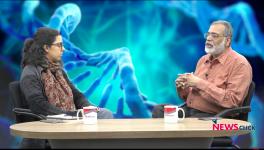Gene-Edited Twin Babies May Have Increased Mortality Rate by 21%

Image Courtesy: Science daily.
It was only last November that He Jiankui, the Chinese scientist claimed that he gene-edited two embryos conceived after in vitro fertilisation (IVF) and twin babies were born. The claim was that the gene editing rendered the twins resistant to HIV infection. Now, a study conducted in University of California, Berkeley says that the gene mutation that was done in the genomes of the twin babies is associated with 21% increase in mortality in later life. The study is published in Nature Medicine yesterday.
The researchers of the study scanned over 4,00,000 genomes and associated health records contained in UK Biobank, a British database. They found that people having two mutated copies of the gene had a significantly higher death rate between ages 41 and 78 than those with one or no copies. Also, some previous studies showed the association of two mutated copies of the gene CCR5 with a four-fold increase in the death rate after influenza infection along with higher overall mortality rate.
Ramsus Nielsen, the co-author of the study said —“ Beyond the many ethical issues involved with the CRISPR babies, the fact is that, right now, with current knowledge, it is still very dangerous to try to introduce mutations without knowing the full effect of what those mutations do," said Rasmus Nielsen, a UC Berkeley professor of integrative biology. "In this case, it is probably not a mutation that most people would want to have. You are actually, on average, worse off having it”.
Another author of the Nature paper, Xin Zhu Wei explained the effect of gene mutations—“Because one gene could affect multiple traits, and because, depending on the environment, the effects of a mutation could be quite different, I think there can be many uncertainties and unknown effects in any germline editing.”
CCR5 Mutation Prevents HIV Infection
The protein that CCR5 codes for, sits on the surface of immune cells and helps strains of HIV, including the most common ones to enter and infect them. He Jiankui claimed that he introduced mutation in the gene that would prevent HIV infection. Notably, naturally occurring mutations that make the protein non-functional are rare among Asian populations, but a mutation found among the 11% of Northern Europeans protects them from HIV infection.
What Jiankui did is—he made a mutation in CCR5 gene called the delta 32, which refers to a missing 32-base-pair segment in the gene. This mutation makes the cell able to thwart the HIV binding and infection. Jiankui was not able to introduce the natural mutation that provides the North Europeans the resistance to HIV infection, however, he could do similar deletion that would inactive the protein made by CCR5 gene. One of the twin babies was reported to have one copy of CCR5 modified by CRISPR-Cas9 gene editing, while the other baby had both copies edited.
Nielsen and Wui studied the effect of Jiankui’s mutations using the data from UK Biobank. This database contains information of half million UK citizens that is linked to their medical records. Their analysis indicated a higher mortality rate for those with two mutated CCR5 genes. And fewer than expected survived from ages 40 to 78.
According to Nielsen, the CCR5 mutation that is naturally observed among the North Europeans, must have favoured by natural selection at some point of time, and probably for other function other than specifically providing resistance to HIV. This is because; HIV has circulated among humans only since 1980s.
The analysis of the researchers poses a caution for gene editing done in somatic as well as germline cells, that would have to be considered in future by the scientific community. The effects of mutating a gene might not be predicted early as single genes interfere in many cellular networks.
Also Read: World’s First Gene Edited Twin Babies: How Ethical is This?
Get the latest reports & analysis with people's perspective on Protests, movements & deep analytical videos, discussions of the current affairs in your Telegram app. Subscribe to NewsClick's Telegram channel & get Real-Time updates on stories, as they get published on our website.

















